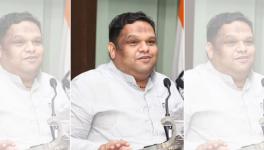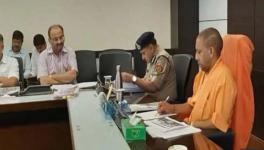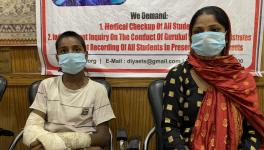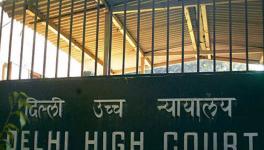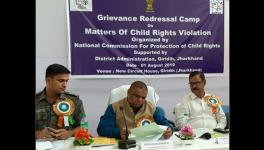UP: NCPCR Bid to ‘Trace’ Non-Muslim Students in Madrasas; ‘Discriminatory’, Says UPMEB
Children studying in a madrasa .Representational Image. Image Courtesy: PTI
Lucknow: The National Commission for Protection of Child Rights (NCPCR)’s recommendation to trace non-Muslim children studying in all government-funded/recognised madrasas and shifting them to other educational institutes along with mapping all unmapped madrasas has triggered a fresh controversy in the state. The UP Madrasa Education Board (UPMEB) has unanimously rejected the NCPCR recommendations.
With the move sparking fierce criticism from Muslim organisations and Opposition parties, the Board chairman Iftikhar Ahmed Javed, while opposing the NCPCR recommendation, said it was “discriminatory” and goes against the tenets of the Madrasa Education Board. The students taking education can not be differentiated on the basis of religion, it added.
"We follow the ideology of Prime Minister Narendra Modi's ‘Sabka Saath, Sabka Vikas’ and will never remove the students of non-Muslim faith from madrasa, shifting them to other institutions. This kind of practice should not be implemented in the education sector. If parents are sending their children to our madrasas, they will continue to study there,” Javed told the media.
He went on to add that "the madrasa education board has unanimously rejected the NCPCR recommendations."
Speaking with NewsClick, Javed said: "PM Modi wants children studying at madrasas to hold the Quran in one hand and a computer in the other. Allowing a survey of children in madrasas of Uttar Pradesh is not right; it will encourage discrimination among children on religious grounds. Non-Muslim children are studying in madrasas and non-Hindu children are studying in Sanskrit schools. Children of every religion are also studying in missionary schools. I myself studied at Banaras Hindu University (BHU). The NCPCR should reconsider their letter."
He added, "We will not allow a divide to be created between Muslims and non-Muslim communities as this goes against the Bharatiya Janata Party’s (BJP) principle of Sabka Saath Sabka Vikas."
Seeking that the Commission reconsiders its recommendation, Javed had stated that "we are providing modern education to children under NCERT (National Council of Educational Research and Training) syllabus. Only religious education is not being imparted in madrasas.”
"If the NCPCR head has any evidence of forced religious conversion of any student or forceful admission of non-Muslim students in a madrasa, then he must share inputs and lodge an FIR,” Javed said.
THE ISSUE
The controversy started in December last year after a notification was issued to the UP Minority Affairs and Waqf Department wherein the NCPCR said that giving Islamic education to non-Muslim students was a violation of Article 28(3) and sought a reply within three days.
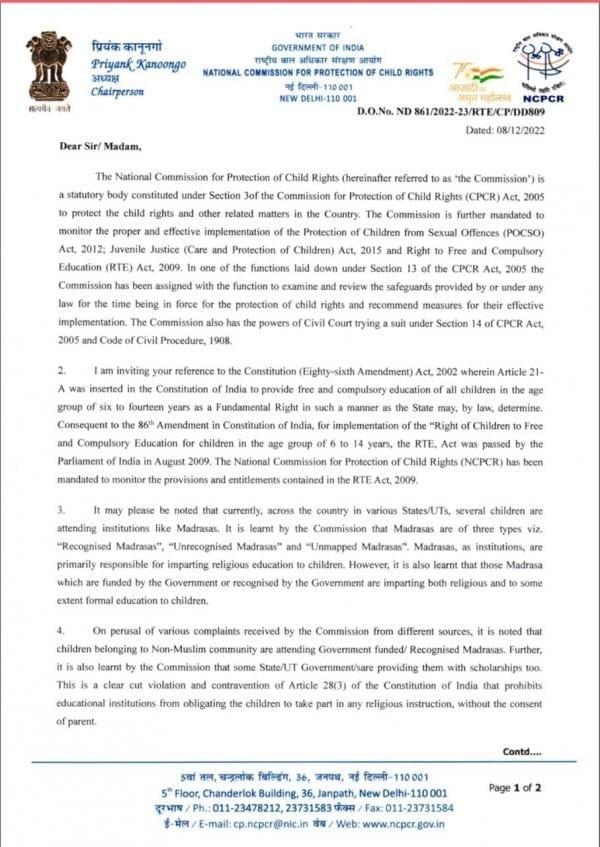
The Commission had also recommended all non-Muslim children studying in madrasas be admitted to other schools after the inquiry.
The decision was conveyed in a letter written by the NCPCR Chairperson Priyank Kanoongo, on December 8, 2022, to all Chief Secretaries, who had noted that children belonging to non-Muslim communities were attending government-funded or recognised madrasas. "It is also learnt by the commission that some States and Union Territories are providing them with scholarships too. "It is a clear-cut violation and contravention of Article 28(3) of the Constitution of India that prohibits educational institutions from obligating the children to take part in any religious instruction, without the consent of the parent," the letter stated.
Madrasas, as institutions, are primarily responsible for imparting religious education to children, the commission said, adding it was learnt that those madrasas funded or recognised by the government were imparting both religious and to some extent formal education to children.
Meanwhile, soon after the UPMEB unanimously rejected the recommendations of NCPCR to inspect recognised madrasas in order to trace non-Muslim students and shift them to other educational institutes, the commission served a notice to the state government seeking a compliance report within three days.
Shuchita Chaturvedi, a member of the Uttar Pradesh State Commission for Protection of Child Rights, attacked the madrasas and termed it unfair for non-Muslim children to study in madrasas.
MADRASA BODY WRITES TO PM MODI, PRESIDENT
The All India Teachers Association Madaris Arabiya -- a teachers’ body has also written to the President and Prime Minister stating that NCPCR recommendations were violative of the Right to Education and go against the spirit of the Constitution of India.
Wahidullah Khan Sayeedi, the national general secretary of the organisation, stressed in the letter that such recommendations create “hatred and animosity” in society while also creating a sense of “suspicion and ill-will” toward madrasas.
Sayeedi said the issuance of such letters and directions for educational institutions "on the basis of mere complaints and imaginations” and “without any concrete proof or evidence” only harms their image. He also insisted that dividing educational institutions on the basis of religion, community or caste and creating a sense of animosity towards them on these lines was not right.
Saying that no student is given admission in any madrasa without the consent of their parents, Sayeedi has urged the President and the Prime Minister to take appropriate action on the letter of NCPCR’s chairperson.
MODI'S MADRASA MODERNISATION PUSH?
The Uttar Pradesh madrasa body and teachers' association has expressed doubts over the Narendra Modi-led Union government's intention that claims it wants to 'modernise' the syllabus of madrasas in Uttar Pradesh so that the students are also taught subjects like Math, English, Computer Science and Hindi.
The teachers' associations alleged that for more than three years they have not been paid salary despite several protests in the state.
Badre Alam, a teacher in Gorakhpur told NewsClick: "Out of a hundred, four-five are Hindus in general, that too not enrolled in every madrasa. They come as they do not have a school nearby their house, we don't bring non-Muslim children to the madrasa forcefully, they come with the consent of their parents. However, we don't teach them Urdu and Arabic. If their parents ask us to teach Urdu, then we teach them."
Muslim Khan, a madrasa teacher in Ghazipur told NewsClick: "Education should not be painted in two colours - Hindu and Muslim. For a teacher, students coming to a madrasa, missionary or any other school are only students. We don't view children through the lens of religion. Though it is an Arabic word, which means an educational institution, we no longer work on the old traditional patterns of teaching. Every subject including Maths, Science, English etc apart from Urdu, Arabic and the Quran is taught. We also teach Sanskrit to non-Hindu students,”
Khan who teaches at Khwaja Gharib Nawaz Madrasa in Ghazipur where nearly 25-to 30% of students are non-Muslims in every class, believes that the madrasas are being targeted for political mileage ahead of the 2024 Lok Sabha polls.
"I have studied in a minority school and when I was in class 6, I was asked to write an essay on Bhishma Pitamah and had written it so well that my teacher was surprised, Therefore, we should not differentiate between students on religious grounds," he said.
Doubting PM Modi's madrasa modernisation plan, Khan alleged: "Madrasa teachers in the state have not been paid their salary for the last three-four years. The government claims they want to modernise madrasas which lack basic facilities, including teacher's training, but they have a very low budget. During the Congress regime, the budget for madrasas was around Rs 200 crore when teachers used to be few, now the budget has come down to Rs 10 crore. Neither the teachers' salary can be given in Rs 10 crore nor the previous dues can be cleared, leave alone modernisation. The government is giving slow poison to madrasa teachers. When the budget is low, then the payment will not be received and when the payment is not received then the teacher will not teach on an empty stomach. The government is waiting for everything to end slowly so that they don't have to take the onus.”
Notably, the UP government's recent directive to all the district magistrates to begin a survey to identify "unrecognised madrasas" has also kicked up a political storm as many minority organisations see it as an attempt to target the community.
Get the latest reports & analysis with people's perspective on Protests, movements & deep analytical videos, discussions of the current affairs in your Telegram app. Subscribe to NewsClick's Telegram channel & get Real-Time updates on stories, as they get published on our website.









